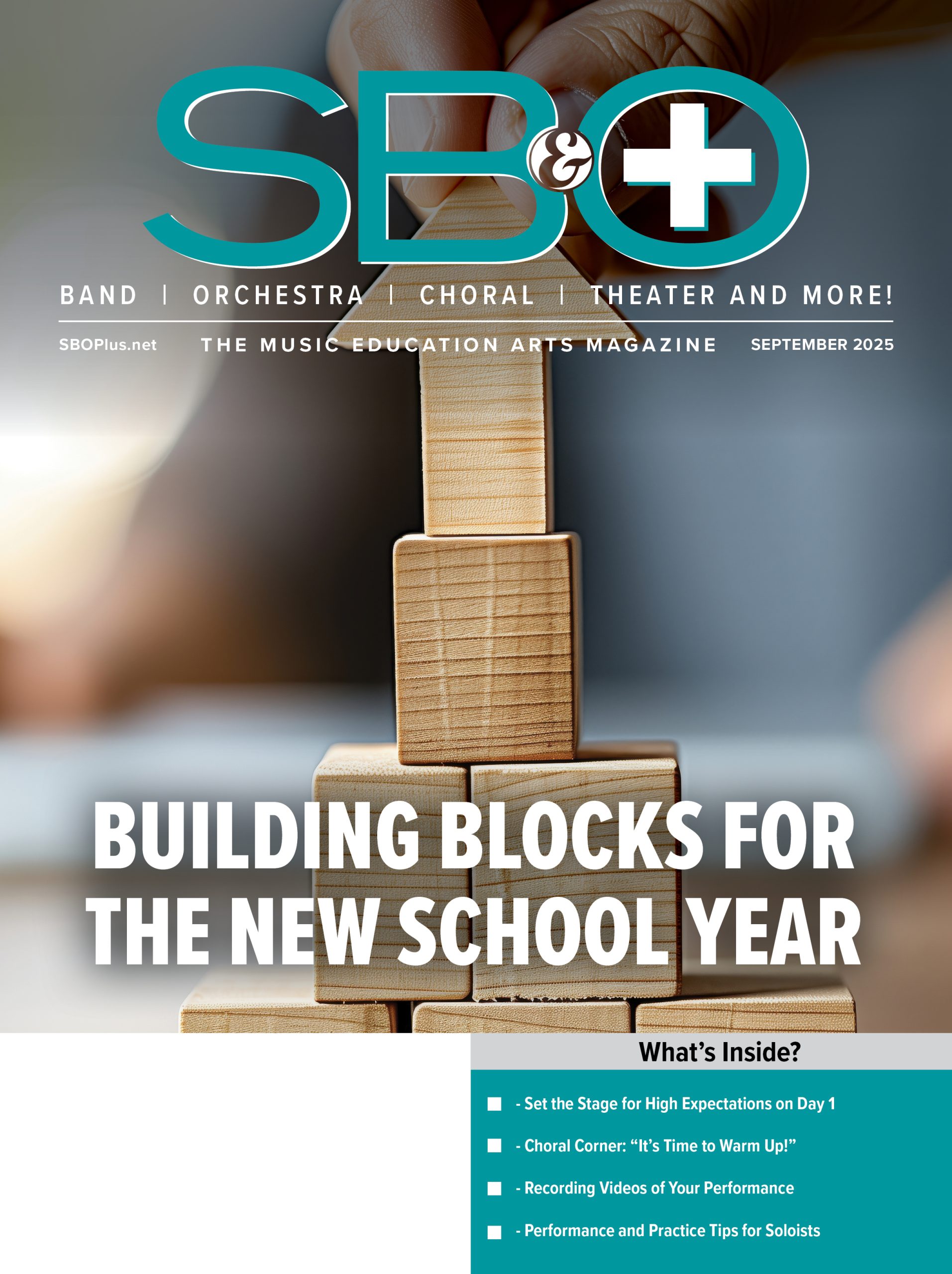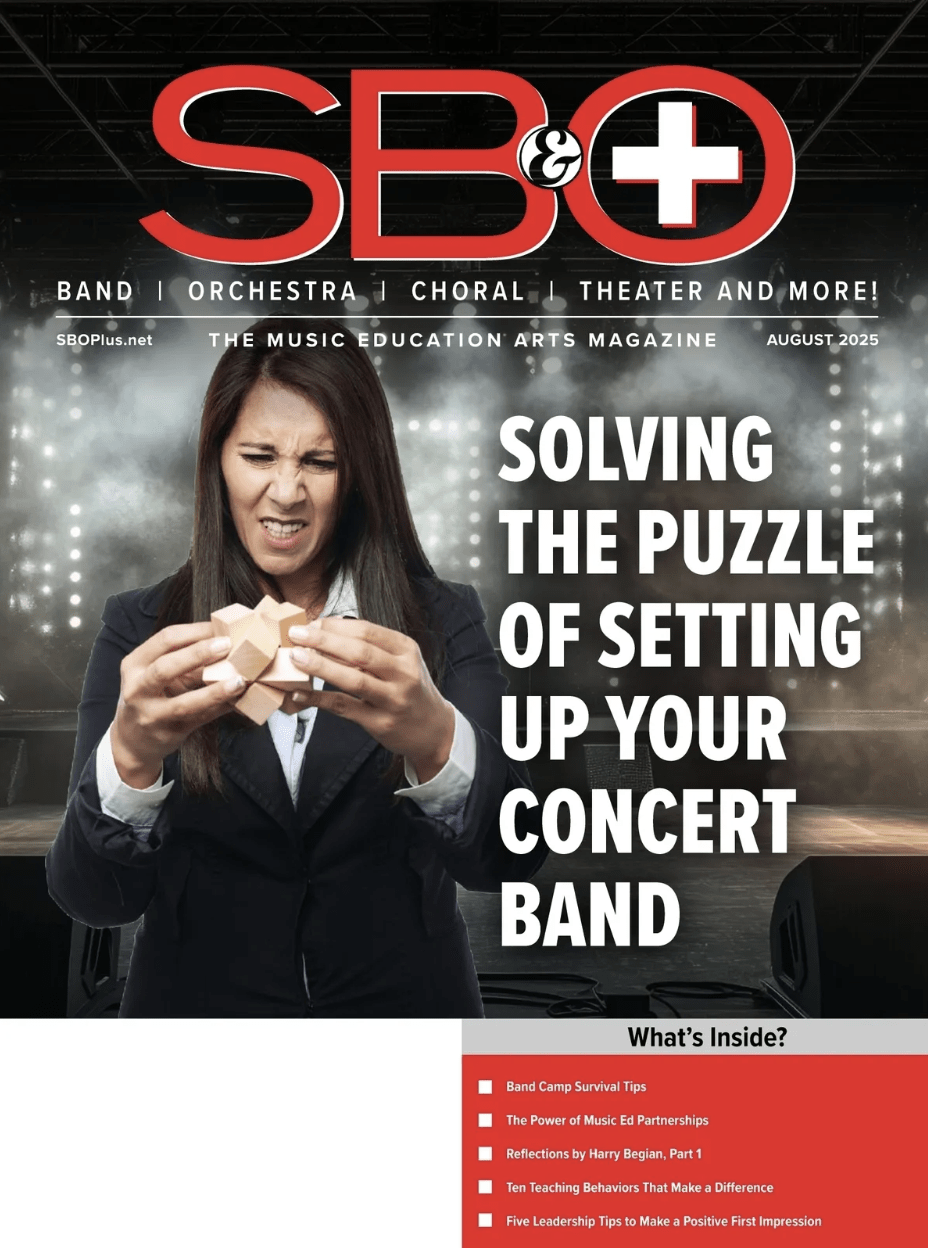A series of visits from professional Chicago-area musicians in high school is forever emblazoned on Dave Samuels’ mind. These visits opened Samuels’ eyes and ears to the creativity and what he refers to as the empowerment of hands-on music education.
“We’d hang out with them and occasionally play with them. Those were unbelievable experiences,” recalls Samuels, now a professional jazz percussionist who performed with Spyro Gyra from 1977 to 1994.
As a clinician himself, Samuels strives to leave that same kind of indelible impression on the students he coaches.
“The thing about doing a clinic, as far as I’m concerned, is that you want to inspire them, you want to give them information, you want them to leave the clinic with something tangible that they can work with.”
Chris Vadala, a performer and the director of Jazz Studies at the University of Maryland, remembers his life-changing first encounter with a professional musician/clinician.
“When I was 12 years old, I saw a great saxophone player who was still playing in his 80s. When I saw him on stage performing on saxophone and clarinet, I looked at my dad and said, ‘That’s what I want to do,’ ” Vadala, a woodwinds specialist, relates.
Vadala began visiting schools and delivering clinics while he was a member of the Chuck Mangione Quartet from the late 1970s until the early 1990s. He hasn’t stopped – or even slowed down – since. In an average year, Vadala fits 35 to 50 off-site clinics into his teaching schedule. These clinics range from festival adjudications and sectional work to guest appearances for all-state ensembles and artist-in-residencies at colleges and universities.
The Benefits of Working with a Clinician
For students, meeting and working with a professional musician may be a highlight of their musical education – as it was for Samuels and Vadala when they were in high school.
Since his introduction to professional musicians, Samuels has joined their ranks as a top player of the vibraphone and marimba. In addition to his longtime association with Spyro Gyra, Samuels has also performed with Gerry Mulligan, Stan Getz, Chet Baker, Oscar Peterson, Carla Bley, Pat Metheny, Bruce Hornsby and Frank Zappa, among many others. Along with 20 recordings to his credit, Samuels’ honors include five Grammy nominations and “Best Vibes Player” in both Jazziz and Modern Drummer magazines. He is also the author of several instructional method books and videos for keyboard percussion, and has a line of mallets. His latest musical project is the sextet Caribbean Jazz Project.
As a member of the Chuck Mangione Quartet, Vadala traveled to all 50 states in America and more than 15 foreign countries. His awards include two Grammys, an Emmy and a Golden Globe. Vadala has also performed and/or recorded with Dizzy Gillespie, Quincy Jones, B.B. King, Chick Corea, Ella Fitzgerald, Aretha Franklin, Natalie Cole, Herbie Hancock, Ray Charles, and many others. He has written original compositions and arrangements, as well as several method books.
Samuels and Vadala are continuing the clinician tradition by sharing their knowledge and experience with students who are just beginning their musical education.
Samuels points out that, in a clinic setting, the students have the opportunity to forge a unique connection with a professional artist, and to discover that “you’re not someone who’s floating on air who doesn’t speak to those below you.”
Samuels adds, “I also think that the power of being able to play with someone who’s on a very different level forces you to strive for something that you’ve never experienced before.”
Having conducted countless clinics during his career, Vadala understands both sides of the clinician experience for the students involved. At the University of Maryland, he often invites clinicians to work with and inspire his own students.
“Usually directors bring in a clinician because they would like the students to experience an opportunity with somebody different,” Vadala says. “If they can motivate and inspire the students by their performances or by a certain approach that they use, I think that’s a reason why a director brings somebody in.”
Clinic Formats
With musical topics ranging from the general to the specific, Samuels’ clinics are interactive and needs-based. He discusses with teachers beforehand the strengths and weaknesses of the ensembles he’ll be working with and determines the direction each clinic will take.
For instance, a big band may be struggling with improvisation. To begin, Samuels will explain the art and craft of improvisation and then follow that discussion with demonstrations, student involvement and critique. The percussion section may require help in achieving a particular feel; the pianist may be interested in experimenting with different voicings. Samuels will find an approach that works well in each situation.
“I may tell them what to do, but then I want them to do it. I want the students to experience what it is I’m talking about so that they get a very practical understanding as to what it’s supposed to be,” he explains. “I can’t just sit and talk about it. We should be playing so they can experience what’s going on.”
In many cases, band directors will ask Vadala to first observe their ensembles and comment on their performance.
“I try to be positive. The last thing a person needs to do is to come into a foreign environment and immediately start tearing into a group,” he points out. “Now, if there are some problems, I like to accentuate the positive first and say, ‘Wow, it sounded like you played well together, but let’s go back to this spot here and see if we can synchronize time a little bit better,’ or whatever the case may be.”
Other times, Vadala will come prepared with a particular clinic format, according to a director’s requests.
“I actually have outlines of the standard clinics that I do,” he explains. “I have a woodwind doubling clinic – I’ve done that at Midwest and IAJE – so I have a format to draw from. Depending on the level of ability of the place that I’m going, obviously I will either water it down or juice it up a little bit.”
As these clinicians point out, the topics covered in clinics depend both on the level of the ensemble and the amount of time allotted. Both Samuels and Vadala work with students ranging in age and ability from elementary school through college. Some clinics may take place during a single afternoon, while others continue for several days.
Whatever the format, a significant component of Samuels’ clinics is engaging the students in the musical experience.
“The thing about performance is that it’s not an armchair experience. It’s a sport in the sense that it’s a team involvement and people have to learn to play with each other, and they also have to learn to react to each other, really fast. Even though they know what the goal is – the goal is to get it in the basket, or to perform the piece the best they can – there are so many elements that actually change while you’re playing the piece that you have to be able to react to what’s going on. You can’t learn to do that by thinking about it; you can only learn to do it by actually doing it.”
In his clinics, Vadala hopes to reinforce the lessons the director has been teaching while offering a new approach and a different perspective to music education.
“I like to be in a situation where I hope that I can react to a variety of different requests and hopefully impart some information,” Vadala notes. “I often tell people, ‘You may not hear anything new out of my face,’ but if I can reinforce what the teachers have already said, then it adds to the credibility and the validity of what’s going on. And then, maybe if I come up with a different way of approaching something or some new development that they may not be privy to, then all the better.”
Preparing for a Clinic
In preparation for a clinic with a professional musician, Samuels advises music teachers to sit down with their students and map out questions they’d like to ask and topics they’d like to discuss.
“It could be anything from ‘What’s it like going out on the road?’ to ‘How do you play over C7?’ Spend time thinking about ‘What would be interesting to ask this person?’ The direction is really important, as far as I’m concerned. You want to be talking to someone, not over their heads or under their feet or around the corner. You want to be specifically talking to them.”
To keep the primary focus of the clinic on music education, Vadala recommends that band directors take the following steps when setting up a clinic:
- For best availability, schedule clinicians nine months to one year in advance. (Many clinicians are performers and/or educators with busy travel and class schedules and are booked well into the future.)
- When arranging the clinic, provide at least a general idea of what the clinic will address. As the date of the clinic draws closer, give the clinician a more detailed indication of the ensembles’ ability level as well as what topics to cover, and what music and materials to prepare.
- If possible, coordinate travel plans through a travel agent to make it easier for the clinician. Check with the clinician to ensure that flight times do not conflict with performances or class schedules.
- Notify the clinician of any “minor” details, such as concert attire, that may affect what to pack for the trip.
- Schedule the clinic(s) to be busy, but not exhausting – not only for the clinician, but also for the students. Include some less formal opportunities, such as a casual lunch, for students to interact on a different level with the clinician.
Dave Samuels is a Yamaha clinician and can be contacted through his Web site at www.dsamuels.com. Chris Vadala is a Selmer clinician and can be contacted through his Web site at www.chrisvadala.com.


























